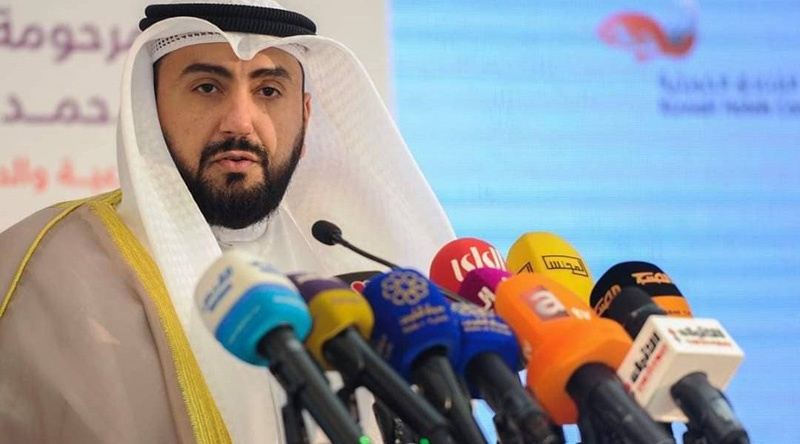
By B Izzak
KUWAIT: Health Minister Sheikh Dr Basel Al-Sabah expressed hope that coronavirus restrictions could be eased after the Eid Al-Fitr holidays, a month from now. But the minister said he cannot be absolutely certain that some of the restrictions will be lifted. Neighboring countries like the United Arab Emirates and Saudi Arabia have eased massive shutdowns on the occasion of the holy fasting month of Ramadan, with UAE allowing shopping malls, cafes and restaurants to resume partial operations after adopting strict measures.
The number of coronavirus cases reported in Kuwait over the past two days increased after the health ministry said it was adopting "active surveillance" to test a larger number of people, especially in expat-dominated areas. A majority of the cases detected are among expat workers living in unhealthy houses and in overcrowded rooms. Of the 2,892 cases reported in Kuwait until Saturday, only 456 of them are Kuwaitis and the rest are expats, topped by Indians with 1,504 cases, followed by Egyptians with 279 cases.
A number of lawmakers yesterday called for making it even stricter for expats to obtain a driving license in a bid to reduce the number of vehicles on roads to avoid congestions. The calls came as the National Assembly's interior and defense committee is preparing to study a new traffic law as part of efforts to reduce traffic jams on roads.
MP Safa Al-Hashem said in statements that the new law should include provisions that make it even more difficult for expats to obtain a driving license. The traffic department is already applying strict rules for expats to get a driving license. Hashem said that a number of expatriate present fake contracts stipulating high salaries as a means to obtain a driving license, saying authorities should stop this. The new traffic law is expected to be ready by the time the Assembly resumes holding sessions suspended because of the coronavirus.
MP Al-Humaidi Al-Subaei said yesterday he will submit a proposal calling to toughen penalties against those who cheat in the foodstuff trade by either selling food not fit for human consumption or whose validity date has expired, proposing a jail term of up to two years for the two violations. If the violation leads to death or disability, the penalty will be a death sentence, according to the proposal.
The global death toll in the novel coronavirus pandemic soared past the grim 200,000 milestone yesterday, as the World Health Organization warned against "immunity passports" for recovered patients, seen as a possible tool for countries preparing to re-open their economies. The WHO opposes such "passports" because recovery from the virus might not protect a person from reinfection. "There is currently no evidence that people who have recovered from #COVID19 and have antibodies are protected from a second infection," the UN health body said in a statement.
Meanwhile hundreds of millions of Muslims around the world spent the second day of the Ramadan holy month out of mosques and avoiding large family meals to break the fast because of sequestration and social distancing policies. And Australians and New Zealanders marked Anzac Day without the normal parades and public ceremonies to commemorate fallen soldiers. Instead, under social distancing policies, people held dawn vigils in front of their homes.
Even as governments from Sri Lanka to Belgium to the United States began moving in the direction of partial reopening, the COVID-19 pandemic still had nearly half of humanity under some form of lockdown or confinement. Total cases around the world rose to 2.86 million and deaths mounted past the 200,000 mark, doubling since April 10, according to an AFP tally. Europe, the hardest-hit region, has recorded 122,171 coronavirus deaths.
The US toll rose by 2,494 over the past 24 hours to hit 53,511 deaths. The number of coronavirus cases in the United States jumped by nearly 46,000 to 936,293 since Friday. In Italy, the number of COVID-19 fatalities rose to 26,384; Spain 22,902, France 22,614 and the United Kingdom 20,319.
The world remained in wait as companies and governments raced to develop treatments and, eventually, a vaccine for the virus, which first surfaced in China in late 2019. The WHO warned on Saturday that people who test positive and survive infection cannot be certain they will not be hit again by the coronavirus. The warning came as some governments study measures such as "immunity passports" for those who have recovered as one way to get people back to work after weeks of economic shutdown.
People holding such a "passport" may tend to ignore public health advice, such as continuing to wear facemasks, assuming they are not a danger to themselves or others, the WHO said. That is a particular worry as testing becomes more widespread, especially testing for coronavirus antibodies, whose presence indicate a person had previously contracted the virus and recovered.
Despite Saturday's grim milestone in virus fatalities, the daily toll in Western countries appeared to be levelling off and even falling, a sign hopeful epidemiologists had been looking for. Likewise, new reported cases appear to have plateaued at about 80,000 a day. But in many countries there were worries of a second surge after lockdown restrictions are eased, possibly also coinciding with a new flu season.
In hard-hit Iran, health officials Saturday raised fears of a "fresh outbreak" with another 76 fatalities declared, bringing the country's official death toll to 5,650. Iran has steadily allowed the restarting of businesses that were closed to stop the virus spread. But Alireza Zali, a health coordinator for the capital, criticized "hasty reopenings" that could "create new waves of sickness in Tehran". Even so, the pressure from broken economies and citizens frustrated by stay-at-home orders had areas pushing to open up.









